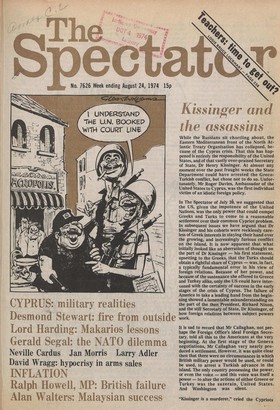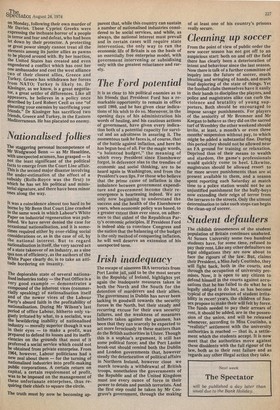Kissinger and the assassins
While the Russians sit chortling about, the Eastern Mediterranean front of the North Atlantic Treaty Organisation has collapsed, because of the Cyprus crisis. That this has happened is entirely the responsibility of the United States, and of that vastly over-praised Secretary of State, Dr Henry Kissinger. At almost any moment over the past fraught weeks the State Department could have arrested the GrecoTurkish conflict, but chose not to do so. Unfortunately, Mr Roger Davies, Ambassador of the United States to Cyprus, was the first individual victim of an idiotic foreign policy.
In The Spectator of July 26, we suggested that the US, given the impotence of the United Nations, was the only power that could compel Greeks and Turks to come to a reasonable settlement over their common Cypriot problem. In subsequent issues we have argued that Dr Kissinger and his cohorts were recklessly careless of Greek interests in staying their hand over the growing, and increasingly furious conflict on the island. It is now apparent that what initially looked like an aberration of thought on the part of Dr Kissinger — his first statement, upsetting to the Greeks, that the Turks should obtain a rightful share of Cyprus — was, in fact, a typically fundamental error in his view of foreign relations. Because of her power, and because of the sustenance she offered to Greece and Turkey alike, only the US could have intervened with the certainty of success in the early stages of the crisis of Cyprus. The failure of America to take a leading hand from the beginning showed a lamentable misunderstanding on the part of the then President, Richard Nixon, and the still Secretary of State, Dr Kissinger, of how foreign relations between subject powers work.
It is sad to record that Mr Callaghan, not perhaps the Foreign Office's ideal Foreign Secretary, told all this to the Americans at the very beginning. At the first stage of the Geneva negotiations, Mr Callaghan very nearly produced a settlement. However, it was quite clear then that there were no circumstances in which British military power would be used, or could be used, to arrest a Turkish advance in the island. The only country possessing the power, or even the voice — and this voice was itself a power — to alter the actions of either Greece or Turkey was the suzerain, United States. And Washington was silent. on Monday, following their own murder of Mr Davies. Those Cypriot Greeks were expressing the inchoate horror of a people in terror and fear and defeat, who had been let down by their protector. A protecting or great power simply cannot treat all the elements among its junior allies as pawns to be played around with. By her inaction, the United States has created and even engendered a conflict which has cost her one ambassador and cost the west alliance two of their closest allies, Greece and Turkey. Greece has withdrawn her forces from NATO; Turkey is likely to. Dr Kissinger, as we know, is a great negotiator, a great settler of differences. Like all appeasers, he believes in a policy once described by Lord Robert Cecil as one "of Placating your enemies by sacrificing your friends." Dr Kissinger has sacrificed two friends, Greece and Turkey, in the Eastern Mediterranean. He has placated no enemy.



































